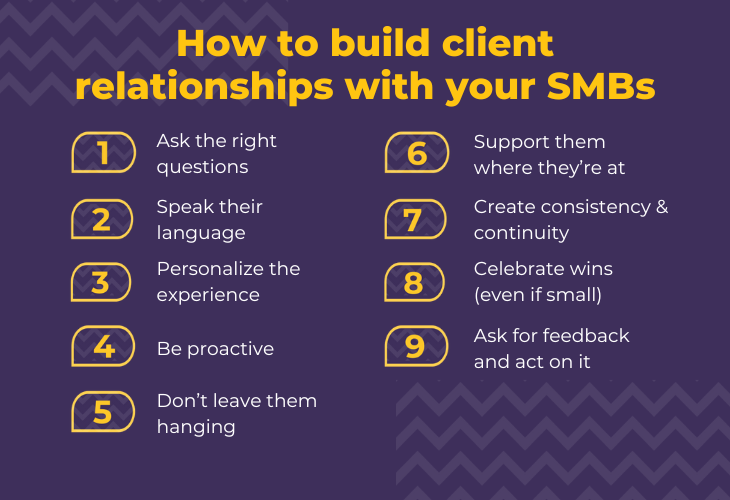Strong client relationships are the foundation for business success. When your clients feel that you have their best interests at heart, they are more likely to recommend you to others, buy into your additional services and products, and demonstrate loyalty over the long term, which boosts your ARPA.
But relationship-building looks different for organizations that serve small and medium businesses. SMBs tend to be more dynamic than enterprises. Their circumstances change frequently and their needs can fluctuate, so forging strong relationships with SMB clients demands more skill and care.
Small businesses can vary widely. For example, a small beauty salon has different needs and concerns to a small accounting firm, even if they’re both the same size and in the same area. A one-size-fits-all approach doesn’t work. You need to understand the pain points and interests of each individual business and treat them accordingly, otherwise you’ll risk high client churn.
As a Senior Customer Success Team Manager with years of experience working closely with both SMBs and partner organizations, I’ve gained a number of insights into relationship-building with SMBs. In this article, I’ll share my hard-won knowledge to help you turn SMB clients into loyal and enthusiastic repeat customers.
Why do strong relationships with SMBs matter?
Even though you have a powerful suite of effective products and services, SMB owners are far more likely to buy them, and be receptive to upsells and cross-sells, if they have a strong relationship with you. They’ll also be more likely to purchase when you expand your offering in the future.
As an organization serving many SMBs, you have expert knowledge that can help each client to thrive. Your experience equips you to make smart suggestions about which tech to adopt, or offer business advice like the best marketing channel to use. As they expand, they’ll consume more of your products and services. But if you want SMBs to listen, they need to see you as a trusted advisor and believe that you can help them grow.
Strong relationships also boost client loyalty and word-of-mouth referrals. When your SMB clients know that you understand their needs, they won’t be likely to switch to a competitor just because they’re offered a lower price. Additionally, when you have a strong relationship with your SMB clients, you’ll be better placed to develop the products and services they really need.
How to build strong relationships with your SMBs

So what can you do, practically speaking, to develop a positive and trusted relationship with your SMBs? Here are the important steps to take to build that relationship.
Ask the right questions
SMBs owners need to feel both that you care about their issues and that you are able to resolve them. Go in with the attitude that you’re here to listen. Ask open-ended questions and listen carefully to the answers that you receive, then repeat their concerns back to them so that they know you’re paying attention.
You need to identify their pain points and understand the intent that drove them to your door. Perhaps they need to deal with a specific issue, like tracking marketing metrics or handling late payments. Only then can you suggest solutions to their problems.
Speak their language
Getting the right tone is essential when you’re talking with SMBs. Enterprise-style language doesn’t come across well in these situations, so learn how to mirror their tone. SMB owners are looking for someone who sounds professional, but can talk to them person-to-person in an informal way.
This requires you to learn their industry jargon as well as knowing their top concerns. If you can speak their language and talk about their main issues, they’re more likely to feel that you know what you are talking about and be willing to trust you.
Personalize the experience
Treat every SMB owner as the individual they are. Put in the effort to memorize information about each client, like the owners’ names, goals, and business contexts. Tailor the advice that you offer to their circumstances, and adapt case studies and testimonials to be relevant to their vertical and challenges.
As you interact with SMBs, listen for clues about trends within each industry so you can point them out to your clients. It’s also a good idea to customize any software solutions you offer. For example, if you provide an invoicing platform, deliver templates that are prepopulated with the kinds of services this client might offer.
Be proactive
When it comes to building relationships, you need to take the lead. Don’t just wait for SMB clients to reach out to you with a question; anticipate their needs. Think about challenges that they could face on a seasonal basis or as their business grows, and send them relevant resources and suggestions for solutions. You could also send reminders about recurring issues that need to be checked from time to time.
Don’t leave them hanging
At the same time as taking the initiative to lead the relationship, you also need to be sure to respond when they get in touch. If a client reaches out to you with a query or for help resolving a challenge, make sure that you reply in a timely fashion. Coming through when a client needs you is crucial for strengthening your relationship.
Support them where they’re at
SMB owners tend to juggle many things at once. They have limited resources and wear several hats, so they don’t have patience for support that’s slow or hard to access. The frustration can boil over quickly.
This means being available across multiple channels, such as email, chat, and SMS. If your client can’t join a Zoom because they’re always on the go, which is the case for many home services companies, for example, offer phone support.
Create consistency and continuity across the organization
In the same vein, your clients want a single seamless conversation, even if it takes place across various channels and reps. Your support agents must always take comprehensive notes, so that if a different agent has to pick up the thread they can do so without any friction.
SMB owners value familiarity, so ideally you’ll assign each client with a regular point of contact. This contact person should be knowledgeable and well informed about all the client’s concerns and challenges. Ultimately, if you want a client to feel a trusted relationship with your organization, you need to provide a single individual who represents that relationship.
Celebrate wins (even if they’re small)
Regular quarterly business reviews (QBRs) that lay out in black and white just how much the client has achieved together with your organization are an excellent way to emphasize your relationship.
You can automate short quarterly summaries that celebrate how many leads the client acquired or how much revenue they brought in. Combine this with spontaneous messages whenever they mark an anniversary, reach a goal, or score an achievement like winning an award or an important customer.
Ask for feedback and act on it
Last but not least, you need to keep up your efforts to listen to their needs. Ask your clients for feedback about your services, products, support, and more, and then act upon the information you receive. Whenever you introduce a new service or adjust your solution because of client feedback, make sure to let your clients know.
How inTandem helps you build better client relationships
Building strong client relationships might sound like a big ask, but vcita’s inTandem partnership offering can help you along the way. As one of the world’s leading SMB software providers, we work with over 150,000 small businesses across dozens of verticals. This gives us a deep understanding of the SMB landscape and the needs, goals, and language of different industries.
Our white label business management solution is built for SMBs, delivering a strong overall product offering that’s sticky, engaging, and ensures that your brand stays top of mind. It’s easy to personalize for each industry, and integrates with your services to create a single unique solution that your clients will love. Meanwhile, our expert employees can become an extension of your team to bring your full solution to market on your behalf.
Build powerful connections with your SMBs at scale with inTandem
SMBs aren’t just smaller than enterprises; they are different overall. Building a relationship with SMB clients requires a different approach, with specific skills, tools, and language. Partnering with SMB experts like inTandem gives you the capabilities to connect with your clients and forge a trust relationship that lasts for the long term.
Ready to learn more about how inTandem can strengthen your SMB relationships? Contact us.



























